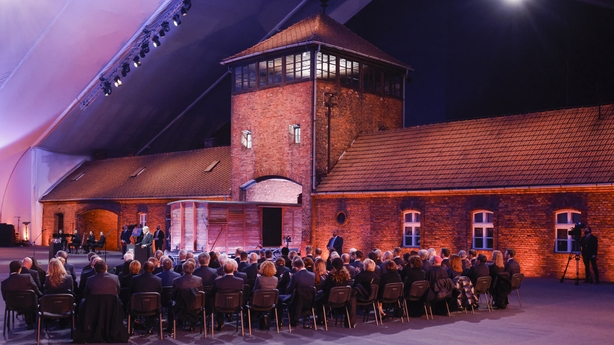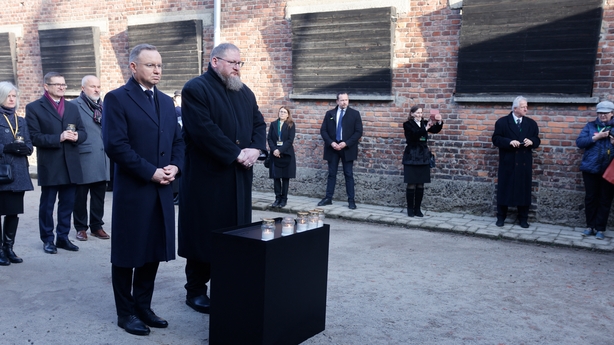Some of the few remaining survivors of Auschwitz-Birkenau have returned to the Nazi-German concentration and death camp, condemning a "huge rise" in antisemitism on the 80th anniversary of its liberation.
The Nazis built the Auschwitz-Birkenau complex of camps in German-occupied Poland in 1940.
1.1 million people were murdered by the Nazis at Auschwitz-Birkenau between 1940 and 1945, most of whom were Jewish.
The commemorative event was attended by more than 50 survivors of Auschwitz.
Four survivors, ranging from 86 to 99 years of age, recounted their memories of the camp and offered their views on today's world at the ceremony.
Three of the survivors warned against the rise of antisemitism during their speeches.
"We see in the modern world today a great increase in antisemitism, and it was antisemitism that led to the Holocaust," said Marian Turski, a 98-year-old survivor of Auschwitz who went on to become a leading Polish historian and journalist.
Author and academic Tova Friedman, now 86 recounted in painful detail her memories of arriving Auschwitz as a six-year-old with her mother.
"Our Jewish-Christian values have been overshadowed worldwide by prejudice, fear, suspicion and extremism," she said, "and the rampant antisemitism that is spreading among the nations is shocking."
Taoiseach Micheál Martin was among more than 50 world leaders and senior envoys to attend today's event at the site of the former camp.
Speaking to RTÉ News after the commemoration, Mr Martin said the ceremony "highlighted the importance of history and memory".

"It was very moving to witness the survivors themselves, who are now a great, senior age, articulate the memories and their sense of what happened to them and their families," said Mr Martin.
He highlighted the speech of Leon Weintraub, a 99-year-old survivor of Auschwitz, who said that "tolerance was important to cultivate".
Mr Martin said it was very important that Ireland was represented at the ceremony "given the rise of antisemitism across Europe and the world".
He said that innovative education programmes should play a role in educating people about the Holocaust.
During today's ceremony, Ronald S Lauder, one of the largest donors to the Auschwitz-Birkenau Memorial and Museum, cautioned against young people receiving most of their information through social media, which, he said was dangerous
Social media narratives, said Mr Martin, "can be overtaken by a particular narrative at a given time".
"We have to be very vigilant about that and I think it starts in the classroom, in respect of educating people about a particular media platform," he said.
"We have to educate young people about the perils and advantages of social media. I think we need to educate young people to navigate it properly".
Auschwitz was the largest of the extermination camps built by Nazi Germany and has become a symbol of the Holocaust of six million European Jews.
One million Jews and more than 100,000 non-Jews died at the site between 1940 and 1945.
Other victims included Poles, Roma and Sinti gypsies, Jehovah Witnesses, gay people, and Soviet prisoners of war.
"Eighty years after liberation, the world is again in crisis," warned Tova Friedman, 86, adding that "the rampant antisemitism that is spreading among the nations is shocking".
Along with Marian Turski, Janina Iwanska, and Leon Weintraub, Ms Friedman was one of four former prisoners who spoke at the ceremony.
In total 50 fellow survivors gathered at the main commemoration outside the gates of Auschwitz II-Birkenau, joined by dozens of world leaders.
Earlier, elderly former inmates, some wearing scarves in the blue-and-white stripes of their death camp uniforms, laid flowers at the site, touching the camp's Wall of Death in silence.
"Today, and now, we see a huge rise in antisemitism and it is precisely antisemitism that led to the Holocaust," Ms Turski, 98, warned those at the ceremony.
Mr Weintraub, a 99-year-old Polish-born Swedish physician, asked for the young to "be sensitive" to intolerance and discrimination and condemned the proliferation of Nazi-inspired movements in Europe.
Also speaking at the ceremony, World Jewish Congress president Ronald Lauder said the horrors of Auschwitz and Hamas's attack on Israel on 7 October 2023 were both inspired by "the age-old hatred of Jews".
(Watch above: Liam Nolan speaks to visitors at Auschwitz)
Antisemitism "had its willing supporters then, and it has them now," he said.
"On January 27, 1945 when the Red Army entered these gates, the world finally saw where the step-by-step progress of antisemitism leads. It leads right here."
"Today all of us must take a pledge to never be silent when it comes to antisemitism or for that matter any other hatred," Mr Lauder said.
The streets of Oswiecim were mainly deserted except for police and fleets of official cars.
The camp was closed to the public and largely silent except for the fluttering of the Auschwitz Museum flags.
Read more:
Auschwitz: Where the Nazis created hell on earth
Protesters removed from memorial while President speaks
How the world discovered the Nazi death camps
A history of Auschwitz-Birkenau 80 years on from liberation
Holocaust generation a narrowing 'bridge' to past horrors
Ukrainian President Volodymyr Zelensky, Britain's King Charles III and French President Emmanuel Macron and dozens of other international leaders attended the commemoration.
Israel was represented by Education Minister Yoav Kisch.
Organisers had however decided not to include political speeches to keep the focus on the survivors.
In a statement, Mr Zelensky said the world must unite "to prevent evil from winning".
Russia's President Vladimir Putin praised the role of Soviet soldiers in ending the "total evil" of Auschwitz.
Until its invasion of Ukraine in 2022, a Russian delegation had always attended the ceremony but Moscow was barred again this year.
Organisers said this could be the last major anniversary with such a large group of survivors.

"We all know that in ten years it will not be possible to have a large group for the 90th anniversary," Auschwitz Museum spokesman Pawel Sawicki said.
"As the number of Holocaust survivors regrettably diminishes with the passage of time, the responsibility of remembrance rests far heavier on our shoulders and on those of generations yet unborn," King Charles said on a visit to a Jewish community centre in Krakow.
Auschwitz was created by Nazi Germany in 1940 using barracks in Oswiecim, southern Poland.
Its name was Germanised into Auschwitz by the Nazis.
The first 728 Polish political prisoners arrived on 14 June of that year.
On 17 January 1945, as Soviet troops advanced, the Nazi SS forced 60,000 emaciated prisoners to walk west in what became known as the "Death March".
From January 21 to 26, the Germans blew up the Birkenau gas chambers and crematoria and withdrew as Soviet troops approached.
On 27 January, Soviet troops found 7,000 survivors when they arrived.
The day of its liberation has been designated by the United Nations as Holocaust Remembrance Day.
Ahead of the anniversary, survivors about the need to preserve the memory of what happened in the death camp and warned of rising hatred and antisemitism. They also expressed fears that history could repeat itself.
Some 40 survivors in 15 countries told their stories, alone or surrounded by their children, grandchildren and great-grandchildren, proof of their victory over absolute evil.
Julia Wallach, who is nearly 100, cannot recall the events without crying.
"It is too difficult to talk about, too hard," she said. The Parisian was dragged off a lorry destined for the gas chamber in Birkenau at the last minute.
But hard as it is to relive the horrors, she insisted she would continue to bear witness.
"As long as I can do it, I will do it." Nearby, her granddaughter Frankie asked: "Will they believe us when we talk about this when she is not there?"
Additional reporting AFP, Reuters







